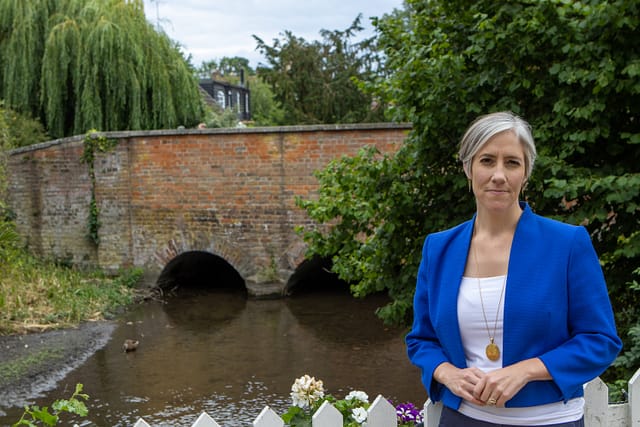
“Pumping poison into our precious chalk streams and rivers is ecological vandalism and it’s happening right here in St Albans, Harpenden and the surrounding areas.”
Daisy Cooper MP is backing a new bill in parliament to ban water companies from dumping raw sewage into local rivers and chalk streams, such as the River Ver and River Lea.
Data for 2021 just released by the Rivers Trust[i] show that the sewer storm overflow at the Markyate Wastewater Treatment Works, operated by Thames Water, discharged untreated effluent into the River Ver as many as 139 times for a total of 2,642 hours during the year.
Another wastewater treatment works at Harpenden, also run by Thames Water, recorded 13 spills over a total of 120 hours into the River Lea.
Compared with the Markyate discharges lasting 2,642 hours, monitoring carried out at six separate sewer overflows along the River Lee from Luton to Hereford recorded 98 spills lasting a total of 1,030 hours.
For England as a whole, data released by the Environment Agency[ii] reports there were more than 372,000 sewage discharges lasting more than 2.6 million hours.
Only 14 per cent of our rivers now meet standards for good ecological status, according to the Rivers Trust, with wildlife groups warning sewage is the biggest risk to animals living in or near waterways, and fears that dogs swimming in rivers are in danger of being poisoned.
The Sewage Discharges Bill[iii], presented in parliament by the Liberal Democrats, seeks to ban water companies from dumping sewage into waterways and to name and shame companies found to poison animals.
The Lib Dems are also demanding a “sewage bonus ban” to outlaw future bonuses for water company bosses until sewage dumps stop.
Analysis of Companies House records, by the Lib Dems, reveals that water companies made a staggering £2.7 billion in operating profits in 2020-21. Thames Water, which was responsible for 33,156 discharges UK-wide in 2020 and 2021, earned revenue of £2.10 billion and made an operating profit of £488 million, while paying its senior executives £2.37 million in bonuses on top of base pay and pensions worth £2.59 million.
Daisy Cooper MP said: “Pumping poison into our precious chalk streams and rivers is ecological vandalism and it’s happening right here in St Albans, Harpenden and the surrounding areas.
“It is appalling that Thames Water was able to discharge raw sewage into the River Ver for the equivalent of four months of the year – and that there’s nothing in law to stop it. I am horrified at the thought of the harm caused to those animals that drank from the same waters that feed the lakes of Verulamium Park, with its thriving wildlife and numerous dog walkers.
“It beggars belief that water companies like Thames Water can earn billions in profits each year while pumping raw sewage into the River Ver and River Lee. The fastest way to end sewage discharges is for the Government to ban the water companies from paying their bosses huge bonuses until the problem is fixed and to force them to report on the wildlife they’ve killed in the process.
“Liberal Democrats are saying enough is enough – it is time the Conservatives in government acted to save our precious animals and wildlife from endless sewage dumps.”
[i] https://theriverstrust.org/sewage-map
[ii] https://environmentagency.blog.gov.uk/2022/03/31/storm-overflow-spill-data-released-today-shows-no-room-for-complacency
[iii] Sewage Discharges Bill – a bill to set mandatory targets and timescales for the ending of sewage discharges into waterways and coastal areas; to make provision about the powers of Ofwat to monitor and enforce compliance with those targets and timescales; to require water companies to publish quarterly reports on the impact of sewage discharges on the natural environment, animal welfare and human health; to require the membership of water company boards to include at least one representative of an environmental group; and for connected purposes. Hansard: https://rb.gy/oudskx.